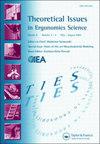Association of organisational factors with work-related musculoskeletal disorders and psychological well-being: a job demand control model study
IF 1.4
Q4 ERGONOMICS
引用次数: 1
Abstract
Abstract Musculoskeletal disorders (MSDs) are a major work-related problem affecting employees’ well-being worldwide. Employee well-being is also associated with high organisational financial and social costs. Most working adults spend a considerable amount of time at their workplace, thus making workplace conditions a critical factor affecting their physical and mental health. This study addresses the role of work-related factors on WMSDs and psychological stress. For this purpose, 210 managers working in middle-level management in an Indian telecom organisation participated in the study. Data for the study was collected using a self-reported questionnaire. 64% of employees reported WMSDs, and 60% psychological stress. Structural equation modelling was used to study the effect of work-related factors on WMSDs and psychological stress. The study reported neck and lower back pain being the most frequently reported WMSD. Job control had a significant negative effect on WMSDs, and psychological stress, while workload did not affect either. Age was significantly associated with pain in the upper back and knees. The results suggested that increasing job control will result in employees’ better physical and psychological well-being.组织因素与工作相关的肌肉骨骼疾病和心理健康的关联:一个工作需求控制模型研究
摘要肌肉骨骼障碍(MSDs)是影响全球员工健康的一个主要工作问题。员工的幸福感也与高昂的组织财务和社会成本有关。大多数在职成年人在工作场所度过了相当长的时间,因此工作条件成为影响他们身心健康的关键因素。本研究探讨了工作相关因素对WMSD和心理压力的作用。为此,印度一家电信组织的210名中层管理人员参与了这项研究。该研究的数据是使用自我报告问卷收集的。64%的员工报告WMSD,60%的员工报告心理压力。结构方程模型用于研究工作相关因素对WMSD和心理压力的影响。该研究报告称,颈部和下背部疼痛是最常见的WMSD报告。工作控制对WMSD和心理压力有显著的负面影响,而工作量对两者都没有影响。年龄与上背部和膝盖疼痛显著相关。研究结果表明,加强工作控制将使员工身心健康。
本文章由计算机程序翻译,如有差异,请以英文原文为准。
求助全文
约1分钟内获得全文
求助全文

 求助内容:
求助内容: 应助结果提醒方式:
应助结果提醒方式:


